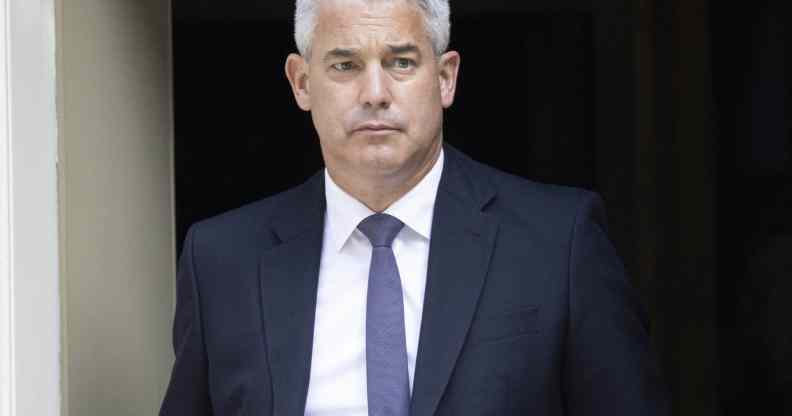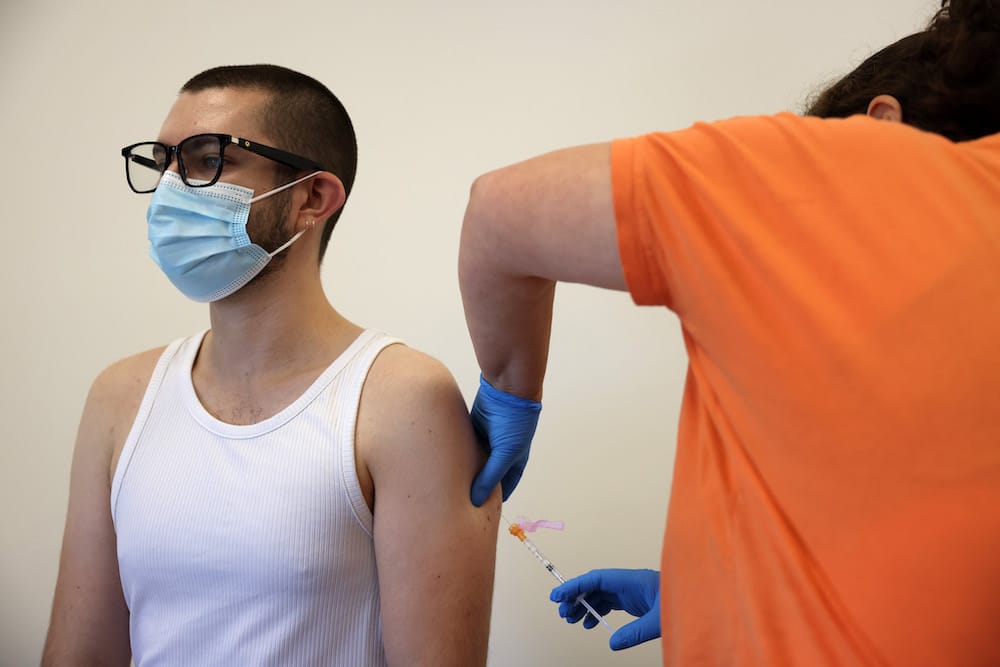Monkeypox: 100 LGBTQ+ politicians urge government to introduce isolation payments

Health and social care secretary Steve Barclay. (Radid Necati Aslim/Anadolu Agency via Getty Images)
More than 100 LGBTQ+ local politicians across the political divide have united to demand the government provide financial support people isolating with monkeypox.
Three months into the monkeypox outbreak, the government has yet to offer the kind of welfare support or wage subsidies for people in isolation as it did at the start of the COVID-19 pandemic.
With UK cases swelling to nearly 3,200, 114 queer councillors and London Assembly members have written to health secretary Steve Barclay, demanding action.
“We cannot resign ourselves to monkeypox becoming endemic. To do so would be to fail a generation of gay and bisexual men,” they wrote.
“As LGBT+ councillors and assembly members from across the political spectrum, we are united in asking that you act now so that we do not pay a greater cost later.”
People who have tested positive for monkeypox can be asked to isolate for as long as three weeks. The letter calls on the government to introduce direct payments for those unable to work during that period.
At the moment, their only option is to either pay out of pocket or get help from already strained welfare programmes not designed to support three weeks’ worth of living costs. This includes the Household Support Fund, which on average gives households just £200 to pay for essentials including bills.
Symptoms for monkeypox usually appear within three weeks and last for two to four weeks, according to the NHS.
Without a financial safety net, the councillors fear some will have no choice but to go out and work while infectious.
“Local authorities are well placed to support those who face financial hardship as a result of needing to self-isolate” but “this needs additional resource and leadership from government,” they said.
“Without clear guidance and reimbursement for local authorities, there is a risk that some people in severe need of financial support will be forced to choose between their health and those of others, and being able to pay the bills.”

A man receives a dose of the monkeypox vaccine in London, England. (Getty/ Hollie Adams)
The councillors’ worries over the government’s handling of monkeypox don’t end there: they are also concerned that when it comes to information-sharing, especially around vaccinations, the burden is falling on the LGBTQ+ community.
“As with the early response to the HIV epidemic, our community is coming together to share information and support each other. The burden cannot fall on LGBT+ people to do this alone and it is not enough,” the letter said.
Over-strained sexual health clinics, which are leading the charge on distributing vaccines, must be financially supported with a £51 million cash injection, they said.
“Sexual health services are at the frontline of tackling monkeypox, but were under enormous strain even before the outbreak began.”
This means that other services they offer, like pre-exposure prophylaxis (PrEP) or contraception, are having to take a backseat, the letter continued.
“Existing funding… simply is not enough to deliver existing services while also delivering the additional cost of identifying, treating, and vaccinating those with monkeypox or at risk of exposure to the virus.
“A substantial number of services have already reported a drop in provision of PrEP as a result of monkeypox.”
Vaccines supplies are dwindling fast, with the UK Health Security Agency (UKHSA) expecting there to be none left by the end of August. Councillors called on the agency to “review its estimates more vaccines must be procured, with coordinated, funded delivery of those vaccines”.
The government must also “provide clear, proactive messaging to [gay and bisexual men, and other men who have sex with men] including utilising queer media, apps like Grindr and other social media networks”.
“We urgently need reliable, centralised information on where vaccines are available.”
The UKHSA advises monkeypox patients to isolate themselves indoors until their symptoms clear up. This means they no longer have a high temperature for 72 hours, have had no new lesions for two days, their lesions have scabbed over and they have no lesions in their mouths. Close contacts of those infected no longer have to isolate.
“The isolation period for those with confirmed monkeypox is crucial for tackling the outbreak and we need to see a UK-wide framework for financial support to be delivered at a local level,” Ian Green, chief executive of sexual health charity the Terrence Huggins Trust, said in a statment.
“No one should be in the position of having to make the choice between doing the right thing from a public health point of view and paying their bills or keeping their job.”
The councillors’ joint plea comes after the LGBTQ+ wings of all major political parties in Britain locked arms and called on the government to “get a grip” on the spiralling outbreak.

